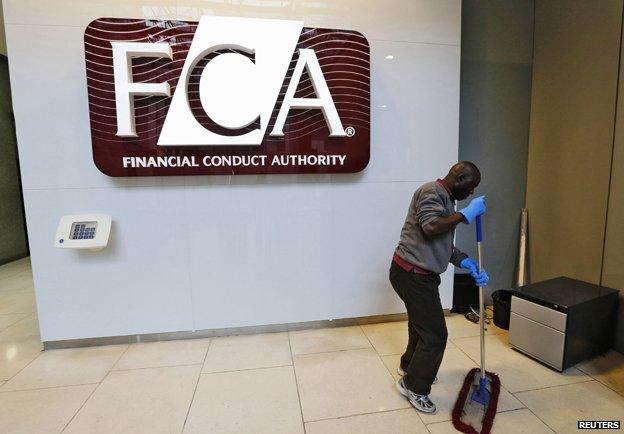Financial regulator in hot water
- Published
- comments

Martin Wheatley, head of the FCA
The report into the fiasco of the Financial Conduct Authority and a mishandled announcement that led to billions of pounds of value being wiped from insurance companies' share price will be published tomorrow.
And it will not make for comfortable reading for the chief executive of the FCA, Martin Wheatley.
I am told there are two major criticisms.
Firstly, that the FCA should not have made a major policy announcement via a briefing to a single journalist at The Daily Telegraph.
You can read the subsequent story that followed that briefing - about a review off "rip-off pensions" going back decades - here, external.
And secondly that the FCA was achingly slow to announce more details to the market despite the Telegraph story leading to plunging share prices across the insurance sector.
Aviva, Prudential and Legal & General all suffered.
Investors became fearful that the FCA review of pensions' policies going back to the 1970s could lead to an insurance sector version of the Payment Protection Insurance scandal that has left banks facing billions of pounds of costs.
It wasn't until well into the afternoon that the FCA clarified the position - more than six hours after trading had opened on the London Stock Exchange.
The review was actually far more benign, and would not mean millions of pensions' policies being subject to scrutiny to see if they were actually value for money.
"This was clearly not the FCA's finest hour," Mr Wheatley admitted at the time.
What gave the report in The Telegraph authority was not just the journalist who wrote it - the respected Dan Hyde (a reporter I used to work with when I was business editor of The Sunday Telegraph) - but the fact that it had a direct quote from Clive Adamson, the director of supervision and a member of the FCA's executive committee.
He was quoted as saying: "We want to find out how closed-book products are being serviced by insurance companies, as we are concerned insurers are allocating an unfair amount of overheads to historic funds.
"As firms cut prices and create new products, there is a danger that customers with older contracts are forgotten. We want to ensure they get a fair deal. As part of the review we will collect information to establish whether we need to intervene on exit charges."
This appeared to raise the possibility of retrospective action going back 30 years if the pension provider could not prove it had acted in the interests of the customer.
It wasn't until mid-afternoon that the FCA clarified the position, a delay that led one insurance chief executive to describe the situation to me as ridiculous.
"This had the effect of creating a disorderly market," the executive said, describing the briefing as "factually incorrect".

The FCA clarification said: "We are not planning to individually review 30m policies, nor do we intend to look at removing exit fees from those policies providing they were compliant at the time.
"This is not a review of the sales practices for these legacy customers and we are not looking at applying current standards retrospectively - for example on exit charges."
I am told - embarrassingly for the FCA - that Mr Adamson did not approve the quote attributed to him despite it coming from the FCA officially.
That raises significant questions for the communications team at the FCA.
Adding to the feeling of a regulator without a firm grip on its own announcements was the fact that when the Telegraph story broke, Mr Wheatley was travelling back from a work trip in Asia.
I am told he didn't arrive back in the office until "mid-morning", as insurers clamoured for more information.
The wider ramifications became clear to the chairman of the FCA, John Griffith- Jones, when he received a letter from the chancellor the following week.
"As you know, I am profoundly concerned about the events of last Thursday and Friday," George Osborne wrote.
"A pre-briefing of information about a forthcoming FCA review appears to have caused considerable disruption in the trading of insurance shares."
For a financial regulator, disrupting the market is about as bad as it gets.
"These events go to the heart of the FCA's responsibility for the integrity and good order of the UK's financial markets, and have been damaging both to the FCA as an institution and to the UK's reputation for regulatory stability and competence," Mr Osborne continued.
Andrew Tyrie, the chairman of Parliament's Treasury Select Committee, described the watchdog's actions as an "extraordinary blunder".
Mr Wheatley - who once famously said he would "shoot first and ask questions later" - and Mr Griffith-Jones both have serious questions to answer.
They have already announced a restructuring at the FCA which you can read about here.
Tomorrow, the FCA will need to make it clear to the financial services sector it regulates, how - precisely - it will ensure that this mess doesn't happen again.
- Published26 November 2014